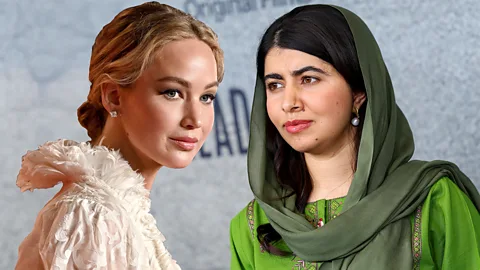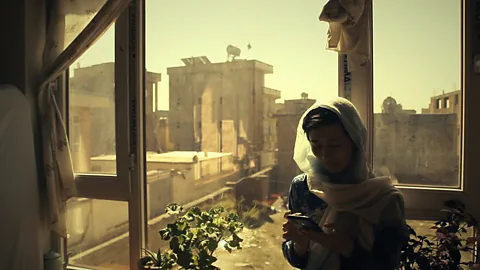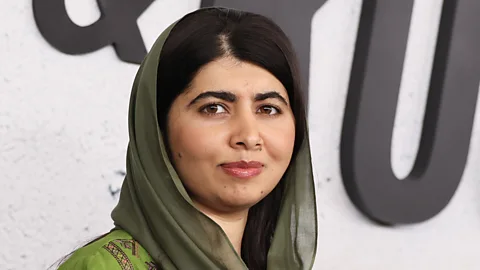 Getty Images
Getty ImagesMalala Yousafzai and Jennifer Lawrence tell the BBC about their new documentary Bread & Roses, which highlights the stories and voices of Afghan women resisting the Taliban.
It’s being called “gender apartheid” by the UN. In August 2021, the Taliban retook control of Afghanistan. A generation of women who had new opportunities to work, study and hold public office under the previous government, found their lives overturned. Girls are refused formal secondary and university education, women are banned from most work sectors, and from using parks and gyms. Beauty salons have been closed. Now female voices are even forbidden to be heard in public. The Taliban has said the new laws are accepted in Afghan society, and in accordance with Islamic Sharia law.
Bread & Roses is a documentary filmed from within Afghanistan by women who have resisted these restrictions on their lives. “I am taking a video, do not call me,” Dr Zahra Mohammadi tells a caller in the film, as she runs downstairs to her workplace.
Dr Mohammadi is a young dentist who celebrated her engagement just before the Taliban reached Kabul, a few weeks before the video is taken. She expresses hope to the audience that she can still work under the new government. “Up until now the Taliban have not bothered doctors, although they’ve just ordered me to remove my name upon the sign,” she tells the camera.
Dr Mohammadi puts her office sign back up in a prominent position on the street, with her name still on it. It’s also a sign of the courage she displays throughout the film. Soon her dental practice is a secret hub for female activists, as the Taliban’s restrictions closes secondary and university education opportunities for girls. As the film continues, female resistance is met with arrests, prison sentences, and disappearances.
Filmed without a narrator and made in the Afghan languages of Dari and Pashto, Bread & Roses (the title is taken from a political slogan adopted by 20th Century suffragettes) is a mainly fly-on-the-wall documentary that relies upon the main protagonists to film themselves. Which they do, at demonstrations where they demand “bread, education and freedom”. They film when they’re arrested at the protests, when they’re sprayed with tear gas, and as their doors are being kicked down by the Taliban. “Girls educated up to 12th grade are stuck at home,” says one older protester of the situation. “They had dreamed of being doctors, engineers and teachers. It’s tragic. They had dreams.”
The film may be directed by an Afghan film-maker living abroad, Sahra Mani (also the maker of a hard-hitting 2018 documentary about the rape of Afghan girls, A Thousand Girls Like Me) but Bread & Roses is backed by Hollywood. It’s produced by Oscar-winner Jennifer Lawrence, and executive produced by the Nobel Peace Prize-winning activist, Malala Yousafzai, herself once the victim of a Taliban shooting.
Lawrence tells the BBC that it was watching the news after the US military withdrawal from Afghanistan, and what she saw unfolding for women, that spurred her into action as far back as 2021. “I just felt desperate to do something,” she says. “And cameras help with helplessness.”
Lawrence says that she wanted to know if anyone was filming what was happening to Afghan women and girls from within the country. “It was important for us to get eyes inside Kabul because that’s exactly what the Taliban did not want,” she says. “So when we reached out to Sahra, as we were already familiar with her work, we found that she was already collecting footage from girls on the ground in Kabul.”
The women in the film were taught how to use cameras, and how, if possible, not to get caught. “I spent time on the border of Afghanistan, to be able to be close to my team and to collect the material,” Mani tells the BBC. “We built a team to train our protagonists how to film themselves and to do it in a safe way, so if their cell phones were checked by the Taliban, they don’t find out about it.”
Making women’s voices heard
Lawrence isn’t the first high-profile Hollywood celebrity to condemn the erosion of Afghan women’s human rights. In September, Meryl Streep told a UN General Assembly event that a cat had more rights than a woman living in Afghanistan, because a cat may go out “and feel the Sun on her face”.
But Lawrence’s activism follows other famous women who’ve put their names to documentaries highlighting recent experiences of Afghan women. Hillary and Chelsea Clinton were two of the producers on the 2022 film, In Her Hands, about Afghanistan’s youngest ever female mayor, and the turmoil she experienced in the months leading up to the Taliban’s takeover.
The Clintons and Lawrence have now also executive-produced a documentary on women’s rights closer to home – Zurawski v Texas (2024), about women who were denied an abortion despite life-threatening circumstances and sued the state of Texas. As some women in the US say their rights over their bodies are being eroded, while others support more restrictive stricter abortion policies, does Lawrence use film-making for what she considers to be good causes?
“I think that film-making is how I deal with life,” she replies. “It’s my artistic process and that’s how I also process. And in a lot of ways, it’s my only weapon when I’m watching something play out and you feel that impotent rage. Zurawski v Texas was extremely timely, as abortion was on the [US election] ballot.
 Apple TV+
Apple TV+“Women are dying because Roe v Wade was overturned, and the dialogue in America around abortion is just so fraught,” Lawrence says. There’s just such a disconnect on what Americans even think abortion is, and so that was really important to lend my voice to.
“Bread & Roses was more born from just a necessity, just watching it happen in the moment and just needing to do something.”
Malala thinks that the very act of filming was these Afghan women’s own way of dealing with the heavy restrictions on their lives.
“It’s a very powerful way of resistance for Afghan women to make their voices loud and clear and to make themselves visible against the Taliban, when they are using everything they have in their power to silence women,” she tells the BBC. “In essence it’s systematic oppression that they’re imposing, they’re controlling literally anything to do with a woman’s life.”
Malala points out that since the documentary was made, Afghan women face even more challenges. A recent decree by the Taliban forbids a woman’s voice from being heard in public, which the Taliban says is based upon their interpretation of Sharia law. They cannot be heard singing or reading aloud from within their own homes. They must be veiled in public, including their faces.A Taliban spokesman told the BBC at the time that this edict is in accordance with Islamic Sharia law and that “any religious scholar can check its references”. They also said they are “working on” the issue of female education.
However, a psychologist working with Afghan women told the BBC this year that they were suffering from a “pandemic” of suicidal thoughts. “You closed the universities and schools, you might as well kill me now,” shouts one woman in Bread & Roses, when told by an official to “shut up, or I will kill you right now”.
“You have brought us horror instead of safety,” screams another woman at them in the documentary.
Although Dr Mohammadi opines in the film that “the Afghan woman is first oppressed at home by her father, brother or husband”, a striking feature of Bread & Roses is the number of supportive men and boys in these women’s lives, usually with their faces blurred for their safety. When the camera is focused on a night-time shot of the city of Kabul, female voices ring out shouting, “education is our right!” After a moment, a male voice is also heard clearly, joining in.
 Getty Images
Getty ImagesMalala tells the BBC she believes public pressure can ultimately force the Taliban into concessions. “They don’t want women to even be in talks that are happening with different countries’ representatives, they do not want women’s rights to be on the agenda,” she says.
“To resist them, we have to do all that they don’t want us to do. Women have to be in those rooms. Women’s rights have to be on the agenda, we have to call out gender apartheid and codify it into treaties, so that perpetrators like the Taliban are held accountable for the crimes that they’re committing against Afghan women.”
Such demands may feel far off. The BBC reported this year that female-led protests have stopped due to the reprisals, although some still post videos online with their faces covered. Sahra Mani says that with “safety as our main priority” when making the film, her main protagonists left Afghanistan before the film was released and their faces were shown.
Mobile phone footage, in a moving epilogue to the film, shows an older woman in hiding, teaching a group of young women in English. “Now this is useful for university entrance exams,” the woman says, as if nothing has changed.
The message of Bread & Roses is summed up in the words of one activist who has to flee, taking a last look at her home country.
“May history remember that once upon a time, such cruelty was permitted against the women of Afghanistan,” she says, as she crosses the border into Pakistan.
Bread & Roses is released on Apple TV+ from 22 November









